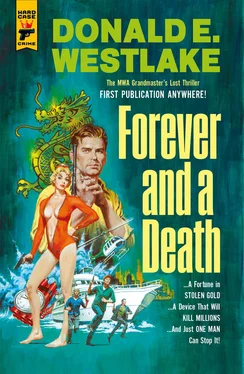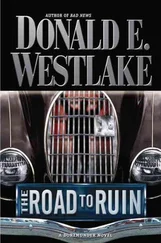“And you.” He didn’t remember her name, if he’d ever known it.
She turned to speak a quick word to the skycap waiting behind her, and he nodded, and moved toward the car as Harben came around to open the trunk. “Your luggage will be taken care of,” she said, “and I have your ticket, so all I need is your passport. You’d like to come to the lounge?”
“Yes. Thank you.”
There was great bustle at the main doors to the terminal, down to his right, but the meet-and-greet led him away to the left, down a quiet corridor where they were almost immediately alone. This passage not only took him to the VIP lounge, it also meant he was not in the main part of the terminal three minutes later, when Kim Baldur and Jerry Diedrich and Luther Rickendorf arrived in a cab.
Curtis had a scotch and water in the lounge while the meet-and-greet took his passport and ticket away to handle the formalities for him. He read a Wall Street Journal he found there, and was amused to see that the paper still thought there was some story left in his little public dance with George Manville. Neither he nor George were actually mentioned, but the story, a rehash of various questionable activities by Robert Bendix and his Intertekno over the last several years, was clearly inspired by last weekend’s flap. So now Bendix receives a little unwelcome publicity, while Curtis goes about his business unobserved; things couldn’t get much better than that.
Half an hour later, the meet-and-greet was back, to smilingly hand him his passport and ticket, and escort him to the plane, along with two other businessmen, one a Brit, the other Japanese. Their route was back hallways, mostly empty, not emerging into the normal public area until they were almost to the gate, where the last of the other passengers were straggling aboard. Standard first-class passengers would have been boarded first, for the coach passengers then to sidle past on their way back to steerage, but the ones brought by the meet-and-greet arrived last, when the fuss and bustle were over. At the gate, the meet-and-greet wished her trio a bon voyage and went away, clipboard still shield-like at her breast, while Curtis and the other two were now greeted by equally smiling and equally attractive stewardesses, who took hand luggage (Curtis had none) and drink orders, and escorted their VIPs to their seats.
Curtis always took an aisle seat, for greater mobility; and what is there to see out of a plane window, after all? Today, his seatmate was a purple-jowled angry-eyed American, already at work, reading what appeared to be a legal brief and making small meticulous notes on a yellow legal pad.
Curtis was immediately reminded of the policeman, Fairchild, and his own crabbed notes, even smaller than this fellow’s handwriting, in that notebook of his. Well, he’d done what he could, with both Fairchild and the lawyer, Brevizin, to put out the fires Manville and Kim Baldur had started. With just a small amount of luck, the whole episode would quickly blow over and be forgotten. No crime, no criminals, nothing to investigate, no cause for suspicion. One Chinese sea officer, dead by his own hand, and one idiotic young woman with an overly rich imagination; nothing more.
He accepted his scotch and soda and silently toasted his own success. His seatmate, after one quick scowling glance to reassure himself that Curtis wasn’t a beautiful woman, had gone back to work, which was also a plus. Curtis wasn’t one for chitchat on airplanes.
Almost immediately, they were taxiing, and as the pilot’s voice told the crew to prepare for takeoff the stewardess came by to reclaim Curtis’s now empty glass, and just like that they were in the sky. Curtis pushed his seat back and his leg rest out, and dozed, smiling, thinking of how well things were going.
Half an hour later, some alteration in engine sound or plane movement brought him awake, to see his lawyer friend still busy. Time for a magazine. He would prefer Scientific American to Black Enterprise , but he’d take what was there. Rising, he walked back to the eye-level shelf where the magazines were stacked, looked through them, settled for Newsweek , and glanced down the aisle at the crowded coach section as he was about to turn back to his seat.
Jerry Diedrich.
Curtis stopped. He had never actually met Diedrich, but he’d seen him at a distance several times (several irritating times), and he’d seen Diedrich’s self-satisfied face in newspapers at least twice. That was him, in the aisle seat of three, talking with a very animated young woman in the middle seat.
Kim Baldur.
It had to be. Curtis had never seen her conscious, but he remembered that sleeping face, and this was her.
And how very lively she was, alive.
Baldur and Diedrich, together, on their way to Singapore. And the man on the other side, the window seat, the blond Germanic-looking one; was he part of the group? Yes; he turned and spoke to the other two, then looked out his window again, at the nothing out there.
Curtis turned away, not wanting to be recognized. He went back to his seat, the forgotten magazine still in his hand, and the stewardess asked him if he was ready for his snack. Yes. And wine? White, please.
While he ate the caviar, and the shrimp, and the hearts of palm, and the other delicacies, Curtis considered the situation. Those three were on their way to Singapore.
There could only be one reason. They hadn’t succeeded in obstructing him in Australia, so they would pursue him to Singapore. They had a mole somewhere in his organization, a spy, he was sure of it; they’d learned he was traveling back today and were on his trail. Diedrich would stop at nothing, would use every advantage, to interfere, to cause trouble. And this time it just couldn’t be allowed.
Who is the mole? Who is the spy in my camp? How do I find him, and how do I get rid of him — and of those three back there?
This new project kept constantly moving him into areas beyond his experience as a businessman. In all his enterprises, he had nearly two thousand permanent employees, plus the thousands more hired for specific short-term jobs in construction and the like, but who among them would be useful for the tasks he now had to assign? Those three would get off the plane in Singapore. They had to be met somehow, they had to be dealt with. The spy in Curtis’s bosom had to be dealt with.
In the seatback ahead of him there nested a telephone. Who could he call, and what could he say, to have these problems taken care of? He thought about his employees, the ones he knew, and he tried to pick and choose and find the right one. He had no one in Singapore like Morgan Pallifer, and it was too late now to phone Pallifer back in Australia and tell him to hurry in their wake. The three had to be intercepted somehow when this plane landed.
Who in Singapore did he know, and trust? Who could handle a thing like this?
The remains of the snack were taken away. Curtis slid his tray into its space in the armrest. He leaned forward and snapped out the telephone.
Colin Bennett drove his little Honda Civic out the East Coast Parkway to Changi International Airport, followed the signs to Terminal 2, and stopped as close as possible to the glass doors where the arriving passengers streamed out, deploying into the taxis and buses and limousines and private cars funneled into orderly ranks; neat and tidy and controlled, like everything else in Singapore.
His Timex said quarter to seven (he’d long ago pawned the Rolex), so the Air Singapore flight from Sydney should be landing just about now. Changi was noted for its efficiency; within fifteen minutes, that flow of incomers over there, through with Customs and reunited with their luggage, would include the travelers from Australia.
Читать дальше







![Дональд Уэстлейк - Enough [A Travesty (novel) and Ordo (novelette)]](/books/416846/donald-uestlejk-enough-a-travesty-novel-and-or-thumb.webp)
